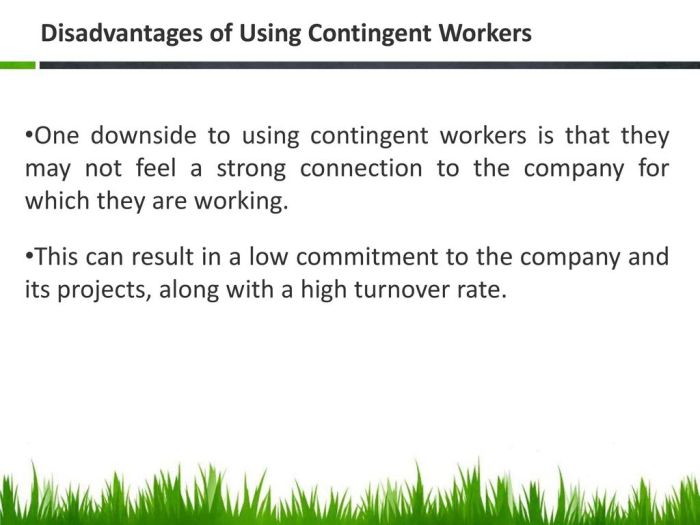One potential disadvantage of using contingent workers is that they may not receive the same benefits and security as permanent employees. This can have a significant impact on their financial and emotional well-being.
Contingent workers are often not eligible for employee benefits such as health insurance, paid time off, or retirement plans. This can make it difficult for them to access healthcare, support during emergencies, and plan for their future.
1. Lack of Employee Benefits and Security: One Potential Disadvantage Of Using Contingent Workers Is That

One potential disadvantage of using contingent workers is that they typically do not receive the same benefits as permanent employees. This can include health insurance, paid time off, or retirement plans. The lack of these benefits can create financial and emotional insecurity for contingent workers.
For example, contingent workers may struggle to access healthcare if they become ill or injured. They may also have difficulty taking time off work to care for a sick child or attend important events. The lack of retirement plans can also make it difficult for contingent workers to save for the future.
2. Limited Career Advancement Opportunities
Contingent workers often have limited opportunities for career growth and advancement within organizations. This is because they are typically not eligible for the same training, mentorship, and promotion pathways as permanent employees. As a result, contingent workers may find it difficult to develop their skills and advance their careers.
For example, a contingent worker who is working as a data entry clerk may not have the opportunity to move into a management position. This is because they may not have the necessary training or experience. As a result, the contingent worker may feel stuck in their current position.
3. Potential for Misclassification, One potential disadvantage of using contingent workers is that
There is a risk that contingent workers may be misclassified as independent contractors. This can have legal consequences for both the contingent worker and the organization. If a contingent worker is misclassified, they may not be eligible for certain benefits, such as workers’ compensation or unemployment insurance.
For example, a contingent worker who is working as a delivery driver may be misclassified as an independent contractor. This is because they may not meet the legal definition of an independent contractor. As a result, the contingent worker may not be eligible for workers’ compensation if they are injured on the job.
4. Impact on Company Culture
The use of contingent workers can impact company culture and employee morale. This is because contingent workers may feel like they are not part of the team. They may also be treated differently than permanent employees. This can lead to resentment and division between contingent and permanent employees.
For example, a contingent worker who is working in a customer service call center may feel like they are not treated with the same respect as permanent employees. This is because they may be paid less, have fewer benefits, and have less job security.
As a result, the contingent worker may feel like they are not valued by the organization.
5. Data Security and Confidentiality
There are potential risks to data security and confidentiality when using contingent workers. This is because contingent workers may not have the same level of training and experience as permanent employees. As a result, they may be more likely to make mistakes or to be careless with sensitive information.
For example, a contingent worker who is working in a data entry position may not be aware of the company’s data security policies. This could lead to the contingent worker accidentally disclosing sensitive information to unauthorized individuals.
Essential FAQs
What are the disadvantages of using contingent workers?
One potential disadvantage of using contingent workers is that they may not receive the same benefits and security as permanent employees. This can have a significant impact on their financial and emotional well-being.
What are the benefits of using contingent workers?
Contingent workers can provide organizations with flexibility and cost savings. They can also be a good source of specialized skills and expertise.


